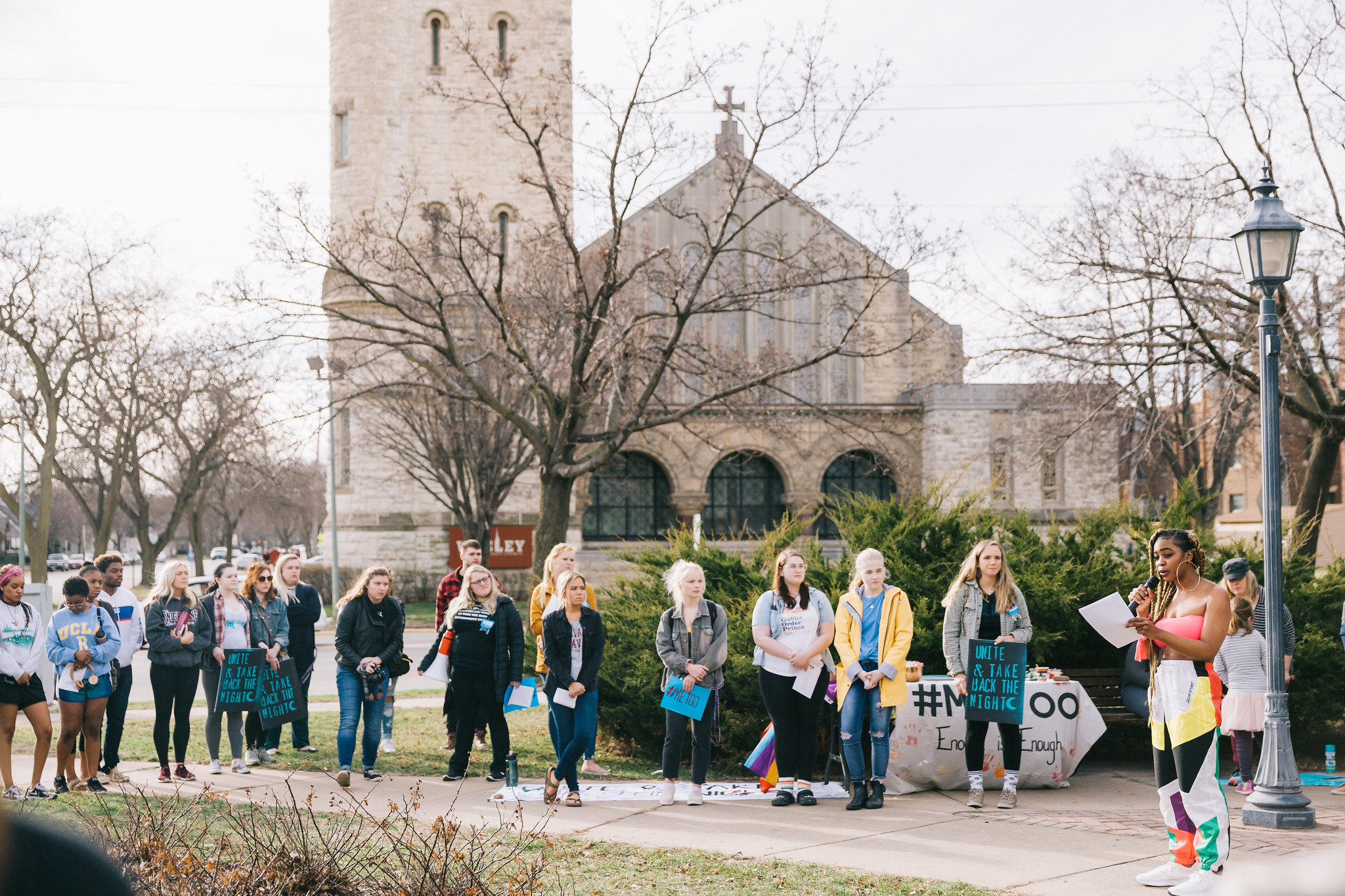A Night for Healing, Community, and Solidarity
Take Back the Night (TBTN) has been a movement that brings to the forefront the prevalence of gender-based violence and creates a community for victims/survivors to feel supported. The movement began in the ’70s to address the violence against women and the first march was organized by the University of Southern Florida. Since then the movement has spread across this nation and the world, creating a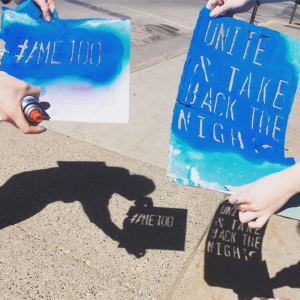 larger movement and a unified stand against sexual and gender-based violence. I asked some of the people in attendance why they felt TBTN is an important event. Emma Severson, a Senior of Winona State University, member of FORGE and Re-Initiative stated, “TBTN is a time for people to take back what has been stolen from them by their perpetrator or perpetrators.”
larger movement and a unified stand against sexual and gender-based violence. I asked some of the people in attendance why they felt TBTN is an important event. Emma Severson, a Senior of Winona State University, member of FORGE and Re-Initiative stated, “TBTN is a time for people to take back what has been stolen from them by their perpetrator or perpetrators.”
Eileen Moeller, a City Council Person, also stated, “As a community, it is important to acknowledge that these things happen within our community, and they happen everywhere. It can also be a transformative and healing event for victims and survivors – being in a group with others who understand and believe you is an important part of the recovery process for many people.” This year Dr. Klinker’s Women’s, Gender, and Sexuality (WGSS) senior seminar had the opportunity to lead in the organization of this event and decided to engage the community with a new focus for this event.
Collective Healing
This year, the WGSS senior seminar centered the work of Tarana Burke and her vision for healing presented in her interview with Aisha Harris. In the interview, Burke states, “We don’t believe in collective stories of people’s trauma because I don’t think the trauma should be curated. We believe in sharing people’s stories of healing. When you start talking about what you’ve done to cope and how you have developed practices around healing, that’s something that people need to see.” The class analyzed works that featured Burke, the founder of #MeToo, Terese Marie Mailhot’s Heart Berries: A Memoir, and Queering Sexual Violence: Radical Voices from Within the Anti-Violence Movement to examine feminist responses to sexual violence.
Burke draws attention to the solidarity that victims/survivors can have and how they can not only validate and acknowledge each other’s stories, but also grow from these experiences together and support healing. In addition, Burke places an emphasis on the importance of healing and providing resources for victims/survivors to access. This was a focus that the WGSS senior seminar also wanted to utilize in the event. In addition to the event itself, this year there were a number of community events that were promoted to continue the discussion of gender-based violence and survivor-centered healing. Some of these events included yoga, a toxic masculinity panel, and women’s health information night.
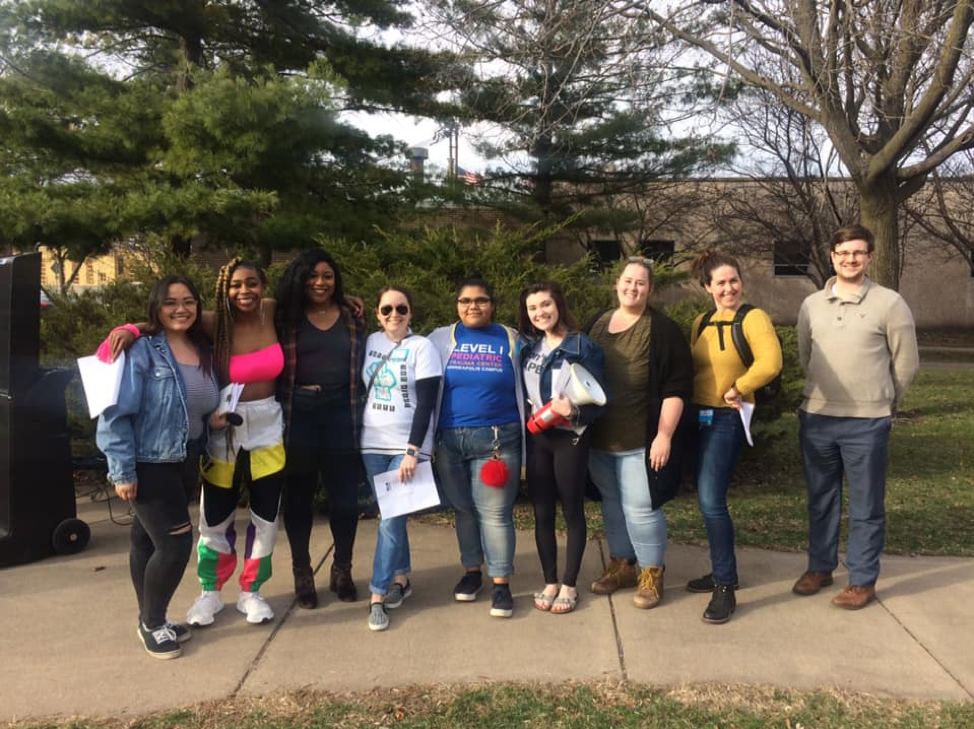
From Margins to Center
In a strong act of solidarity, the night opened with a land acknowledgement from Vanessa Thao, a student in the senior seminar class, which stated that Winona is the ancestral homelands of the Dakota People. The address recognized Missing and Murdered Indigenous Women (MMIW) as this is a prevalent problem in our nation that is going unnoticed and has been ignored historically. The statistics of MMIW are underrepresented as it is difficult to collect actual numbers, but a study by Urban Indian Health Institute (UIHI) identified 506 cases: 128 were missing persons, 280 were murder cases, and 98 were unknown or unidentified. Again, this number is not representative of the nation as a whole.
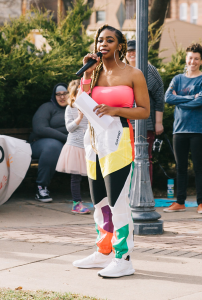
Raeshawn Payton
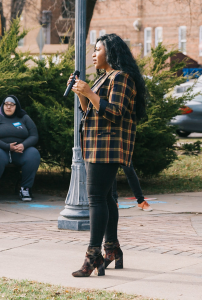
Nathel Kaiyeepu
In addition to the recognition of Indigenous peoples, student performers and speakers spoke about marginalized identities and the disproportionate rates of gender-based violence they face. Raeshawn Payton shared the poem Homage to the Black Madonna by Margaret Burroughs, bringing Black women’s labor of the movement into the space of TBTN. Nathel Kaiyeepu performed a tear-jerking rendition of Sia’s “Chandelier.” The Winona community performer Woolen Lover (Michelle Wiltgen), a Sound and Movement artist, commented, “Being inclusive and recognizing the constant discrimination certain people experience is the work we all must be doing right now . . . I was impressed by the representation of Black, Indigenous, and LGBTQIA+ people and allies. That makes a huge impact to recognize the cross-sections and how sexual violence affects all communities, similarly and differently.” It is important to recognize the impact of sexual and gender-based violence as it affects people with marginalized and intersecting identities at a disparate rate. As Tarana Burke has stated, “This is a movement about the one-in-four girls and the one-in-six boys who are sexually assaulted every year and carry those wounds into adulthood… 84 percent of trans women who will be sexually assaulted this year and the indigenous women who are three-and-a-half times more likely to be sexually assaulted than any other group. Or people with disabilities, who are seven times more likely to be sexually abused. It’s about the 60 percent of black girls like me who will be experiencing sexual violence before they turn 18, and the thousands and thousands of low-wage workers who are being sexually harassed right now on jobs that they can’t afford to quit.” (https://www.bitchmedia.org/article/me-too-year-moment-first-step)
Standing Strong and Marching On!
The night came to a close with a march through downtown and across Winona State’s campus. The march was a protest and movement to draw attention to the event and the message that sexual and gender-based violence must end. This reclaiming of space was meant to be empowering and an act of solidarity. However, this march was met with backlash and a showing of toxic masculinity. As the group marched downtown and past campus dorms they were met with shouts from men. Severson reflected and stated, “An experience that really appalled me was when we were marching around the downtown area and around the dorms and we had men screaming out their windows telling us to ‘shut the f*** up’ and screaming profanities at us. I think it just emphasized why we do what we do . . . It was sad knowing that rather than appreciating the effort to stop such hate-filled crimes, they felt the need to go against us – but that fueled us to get even louder.” Radler also reflected and said, “In spite of all these incidents, the march was an empowering space that felt like an extension of the healing that occurred earlier in the day while also forcing members of the community to pay attention and start conversations about the pervasive violence in this community.” The group finished the march and was able to stay united, sending out an important message to the community.
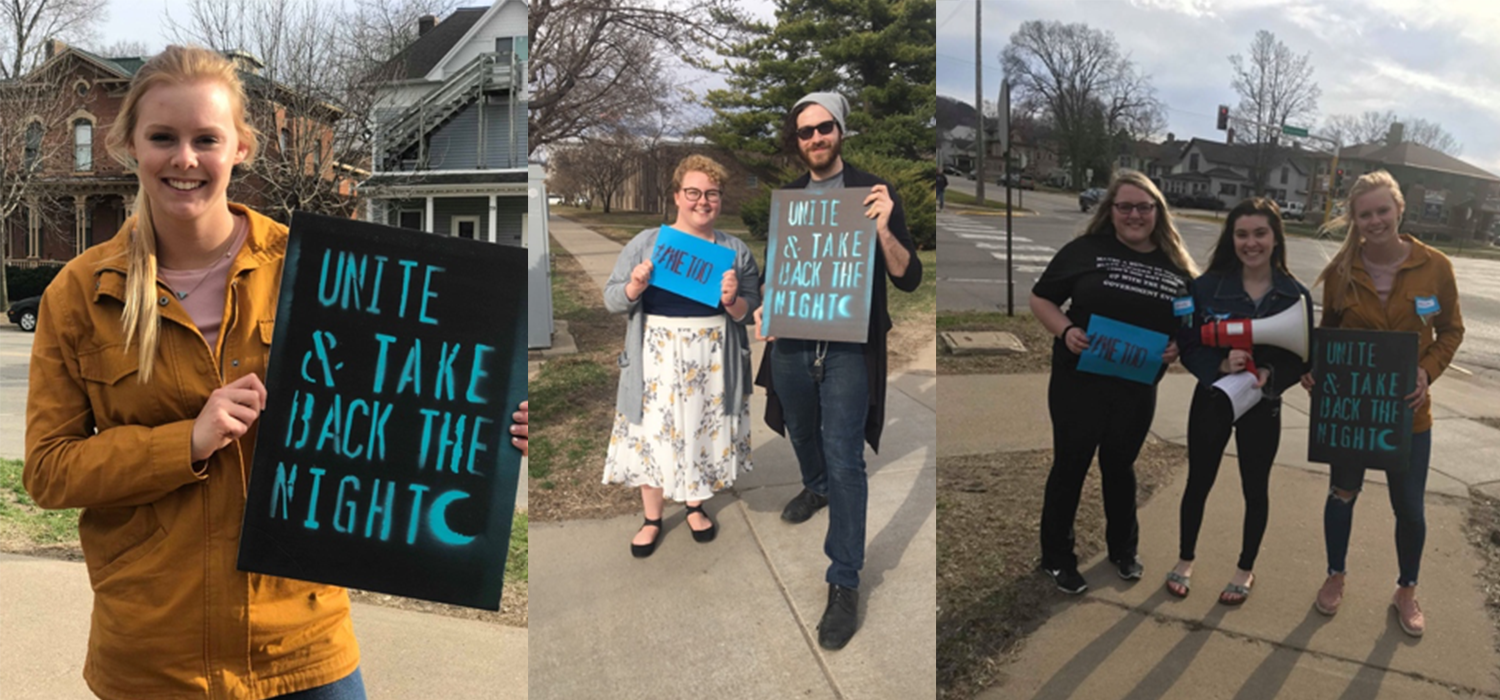
Community Partners
The department of Women’s, Gender, and Sexuality Studies at WSU partnered with both on- and off-campus groups and organizations to promote and plan this year’s event. On-campus organizations include FORGE, Re-Initiative, PACT club, and KEAP Council. The Women’s Resource Center of Winona was an active community partner for this event. The event was also held off of campus this year to bring more community engagement. Sydney Radler, a WSU student and part of the organization of TBTN, expressed, “By choosing a space outside of the university campus, the event was inclusive of survivors who are not connected to WSU but are connected to the broader Winona community.” As an inclusive community it is important to recognize not only that WSU is a one in five campus, meaning that statistically one in five people is sexually assaulted, but that gender-based violence affects everyone in Winona in some way. Together we can take a stand and speak out. Speakers and performances for the event included students, WSU Alumni, and community members. This event would not have been possible without the support of the students and community members who attended.
